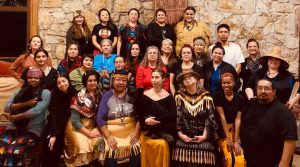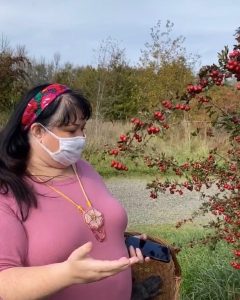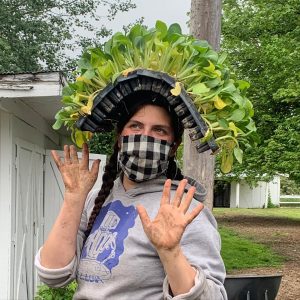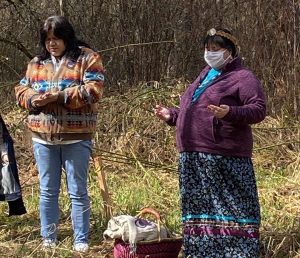The Canoe Journey Herbalists, an intertribal, intergenerational, Indigenous-led nonprofit organization has raised enough funds to purchase 30 acres of land. So much like the work that they do, they raised the money collectively, drawing upon the community to secure funds to purchase land located between Yelm and Rainier in the ancestral territory of the Nisqually Tribe.
 “Over 1,000 people kicked in,” says Rhonda Lee Grantham (Cowlitz), the organization’s founder and co-coordinator. “We received a few large, and amazing, private donations and a grant, but our average donation was around $25, and that small money feels really important to our community and really added up to something big.”
“Over 1,000 people kicked in,” says Rhonda Lee Grantham (Cowlitz), the organization’s founder and co-coordinator. “We received a few large, and amazing, private donations and a grant, but our average donation was around $25, and that small money feels really important to our community and really added up to something big.”
The Canoe Journey Herbalists organization is divided up into six main areas of service, ranging from tending to gardens to tending to elders and Indigenous knowledge sharers. Community care and community education are part of the important work they do; from using the medicine that they make to support the Intertribal Canoe Journey every year, to supporting Indigenous Herbalists through the Indigenous Herbalist Pathway Apprenticeship. (Read this prior ThurstonTalk article on the herbalists to learn more.)

Currently, they do much of their growing and harvesting in wild spaces, and on borrowed plots. “We currently have multiple shared garden spaces that we cultivate,” explains Sophie Geist, the organization’s other co-coordinator and garden manager.
“While we are extremely grateful to use the land that our main garden is on,” Rhonda says, “it feels tentative and we’ve realized that we need security to firmly plant our roots as an organization.”
“This project is so much bigger than Sophie and I,” Rhonda continues. “And it’s bigger than just buying land. It isn’t about an individual, and it isn’t about this generation. It’s about creating a legacy, and we are extremely invested in this space being available for every intertribal indigenous member forever.”
Sophie shared a statistic from the United States Department of Agriculture, that, as of 2002, “Of all private U.S. agricultural land, whites account for 96 percent of the owners, 97 percent of the value, and 98 percent of the acres.” (Source). The statistics are worse for Native Americans, with the data reflecting that a mere 0.7% are landowners, which translates to a small amount of the Nation’s acreage at just 0.4%.

“As the original peoples of the land, I can tell you that that is just wrong,” says Rhonda. “Wrong!”
We can do better in fostering diversity in land ownership, and that’s just what thousands of members of our community have stepped up to do. Wealth redistribution is one of the surest ways to bring about change and begin the vital work of reparations.
Rhonda further explains that in addition to plant medicine, another main reason why the land purchase is so important is to provide access to land for ceremony and healing. “We have taken so many people on their, literally, first ever hike,” shares Rhonda. “A sense of safety is an important element in connecting to the natural world, and there’s a lot of dynamics and a lot of reasons for that. But as BIPOC, marginalized community members, we are hoping to create a space for them to gather and do healing work in a way that feels sustainable and safe, to help mitigate the harms caused by these disconnections and disparities.”
Gardening with Respect
The Indigenous-led organization’s 30 acres encompasses ancient cedars, wild rose, salmonberry, and so many different patches of healing plants, animals and organisms that are just beginning to show themselves. “We will watch the land for several seasons to get to know it before we do any major development,” Rhonda says.

“Yes,” Sophie echoes, “we need to pay attention to how the light falls, what the water table looks like throughout the year, where the animals cross through, and where the best place will be to locate the gardens.”
Harmony, and thoughtful, responsible stewardship in perpetuity are the things that make Mother Nature blossom, and are the things that make gardens grow. That intentionality is what will be driving the gentle development of the parcel when the time comes.
“We are really getting a feel for the land,” says Sophie, “and exploring all of our options,” as she hints at long-range dreams of creating a land trust, making sure the land stays in Indigenous hands and protecting it forever.
The plans are to develop only a few of the 30 acres with a series of small structures, in an effort to keep wild spaces wild for the health of the bioregion and for ceremony. The organization would like to have a community kitchen and medicine making space, a drying room for all of the herbs, a space to teach and to run their programming, and of course, a big garden. But first, there’s a well to drill, and permits to acquire, and all of the other mind-boggling, expensive facets of land development…

On this past first day of spring of the Gregorian calendar, the Herbalists gathered upon the land in its first blessing ceremony. Alé Abreu, (Afro-Lenca) greeted a small handful of attendees from the advisory circle with smoke from plants and resins native to our region and theirs. As a land acknowledgment/blessing ceremony began, Antonette “Maui” Squally, Nisqually Tribe’s vice chairperson, led a prayer in Lushootsheed. The intention of the ceremony was to express gratitude to the Nisqually people for stewarding the land for all time and to express the Canoe Journey Herbalist Project’s commitment to honoring and tending the land in a thoughtful, sustainable, and heart-filled way.
“Let us take a collective breath,” Rhonda says, “as we humbly accept the honor and responsibility of caretaking the plants, creatures, and people who will coexist and find healing in this space.”
If you would like to contribute to the work that the Canoe Journey Herbalists are doing, their fundraising needs are on-going. The Go Fund Me is still active, and if folks would like to donate their dollars without fees attached, they can contribute via Venmo @canoejourneyherbalists. Stay up-to-date with their latest projects by following them on social media.
















































